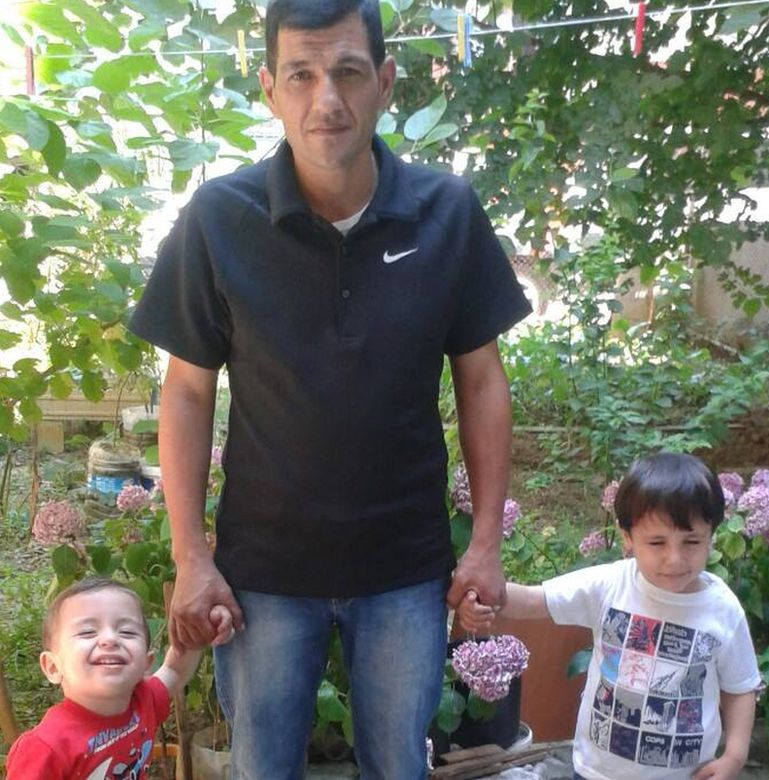Alan Kurdi death: A Syrian Kurdish family forced to flee
- Published

The drowned boy who washed up on a Turkish beach on Wednesday, whose picture cut through the refugee debate in an instant, was two-year-old Alan Kurdi from Kobane in Syria.
Alan set out before dawn that morning from his home in Turkey with his father Abdullah, mother Rehanna, and five-year-old brother Ghalib. The Kurdis were trying to reach Canada to reunite with Abdullah's sister Tima, a hairdresser in Vancouver.
The family joined with a small group of refugees at the coast to attempt the 4km (2.5 mile) crossing to the Greek island of Kos. Abdullah texted Tima from the beach to say they were leaving. "I passed the message to my dad in Syria," she said, "Abdullah is leaving now, pray for his safety."
But her prayers went unanswered. Minutes after they set off, the small boat carrying the family was hit by high waves and the captain fled. Abdullah Kurdi found himself fighting to save his two young boys. Of the 23 people in the group, 14 are believed to have died, including Abdullah's wife and sons.
It was, tragically, not a high number in a summer scarred by mass deaths in the Mediterranean, but the images that emerged set the incident apart. Having floated back to Turkish shores, Alan was pictured lying face down in the sand, his body terribly small, dressed in a red shirt, blue shorts and velcro shoes. In another picture he is seen cradled in the arms of the guard who carried him away.
His name has been spelt 'Aylan' by much of the media, including the BBC, but his aunt Tima told us today that this was a Turkish version of the name given by Turkish officials - his Kurdish name was Alan.
Abdullah Kurdi: "My children were the most beautiful children in the world"
As Syrian Kurds, the Kurdis' chances of being granted asylum in Canada were hampered from the moment they set out for Turkey. For many years, Syria denied its Kurdish population citizenship and Kurds were regarded as stateless by the authorities. A decree in 2011 allowed some to apply for citizenship but others were ineligible and many were forced to flee before they could apply.
The Kurdis had been living in Damascus until the early stages of the Syrian conflict in late 2011. When the violence in the city escalated, they relocated back to Makharij village, 25km outside the northern town of Kobane.
When Kobane became a flashpoint in the conflict between Kurdish fighters and Islamic State militants in late 2014, the family fled along with tens of thousands of others for Turkey. But while crossing Turkey's open border gave them refuge, it did not give them status.
Turkey was the first of Syria's neighbours to respond formally to the refugee crisis, declaring a temporary protection policy in October 2011 that guaranteed no Syrian refugees would be sent home.
Under the policy, those with passports are given a year-long residence permit and are free to move. But those without documents are obliged to register at a refugee camp and stay there, or they are "irregular" - living illegally outside of camps.
This is the situation the Kurdis found themselves in, staying in Istanbul but desperate to leave Turkey. Such people are in a kind of limbo - unable to obtain exit visas from Turkey because they lack passports and unable to win asylum elsewhere because they lack exit visas.
Tima Kurdi had sponsored a "G5" private asylum application for the family of her other brother, Mohammad. Financial constraints and the complexity of the process meant she had to tackle one family at a time - Mohammad was chosen first because he had school-age children.
But the application was rejected by Canadian immigration authorities. Canada's Department of Citizenship and Immigration told the BBC the application was "incomplete as it did not meet regulatory requirements for proof of refugee status recognition".
"I can't even imagine how my brother feels", the boy's aunt said
The reason for the rejection was simple, said Tima; the Kurdis had no passports and no Turkish work permits - documents they were unable to retain.
When the first asylum application was rejected in June, "there was no hope" of Abdullah and his family obtaining the correct paperwork for a successful application, she said. And so they headed for the coastline.
The Kurdis had made three previous attempts to leave Turkey before their fourth and final, family members told the BBC. On the fourth attempt, they worked with people in Izmir to get them to the coast and then on to Kos by boat. They are believed to have paid €4,000 (£2,900; $4,400) for the crossing - several times the cost of an airfare to Canada for the whole family.
Under darkness, the family's boat was pushed out into the waves. Within minutes they were in trouble. In heartbreaking detail, Abdullah described the moment his young family drowned.
"I tried to catch my children and wife but there was no hope. One by one they died," he said. "I tried to steer the boat but another high wave pushed the boat over. That is when it happened.
"My children were the most beautiful children in the world. Is there anybody in the world for whom their child is not the most precious thing?
"My kids were amazing. They woke me everyday to play with me. I would love to sit next to the grave of my family now and relieve the pain I feel."
He said he intends to fly his family to Istanbul and then home to Kobane, where he will bury them.
"It is too late to save Abdullah's family," said Tima. "Please let's use our collective voices to make change and demand that our world leaders take action now to pass emergency refugee measures. Let's put an end to this suffering. Our hearts have been broken."